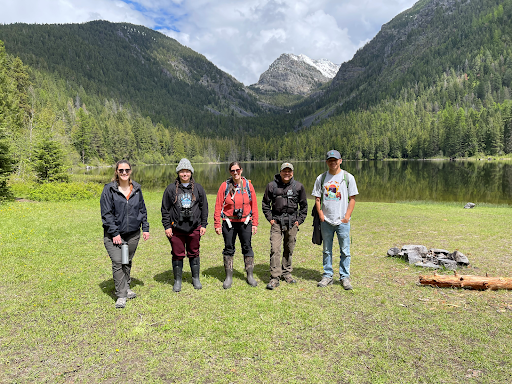In Year 3 of the CREWS project, Georgia Smies, an instructor in the Fisheries and Wildlife Program at Salish Kootenai College (SKC) was awarded a CREWS seed grant to improve Category 1 wetland characterization using remote sensing tools and environmental DNA. As a CREWS seed grant recipient, Georgia Smies has accomplished a great deal with her award and research. Smies’ research was centered around improving wetland characterization using remote sensing tools and environmental DNA. During this research, Smies and her students monitored select sites in the Flathead watershed. Scientists on the project selected three to five sites in the watershed and collected water samples there to analyze in order to determine the aquatic species composition. Game cameras were also installed at each monitoring site in order to view animal activity at each site. This work provided Salish Kootenai College students an opportunity to conduct undergraduate research and learn valuable workforce development skills. Another outcome and benefit of this research was that the data collected by students will be used to augment the characterization of Category 1 wetlands. Category 1 wetlands are classified as mostly undisturbed estuarine wetlands larger than one acre of wetlands in areas of high conservation.
Georgia was inspired to jumpstart this research because of her work with tribal natural resource managers from the Confederated Salish and Kootenai Tribes (CSKT) on the Flathead Indian Reservation. Her knowledge of and work with the CSKT Wetlands Progam highlighted that there is a need for additional data to support their wetland water quality standards. This research has allowed the CSKT access to additional important data, and upon the completion of this research, Smies advocates that the CSKT create wetland standards that match surface waters in the watershed.
The most enjoyable aspect of this research project for Smies was working with her students and teaching them new field techniques. She was able to witness her students grow into their roles as researchers and was very pleased with their research results! The one thing she would do differently if she were to repeat this research in the future would be expediting the grant award process itself, in order to have even more time in the field and with her students.

Caption: SKC students being trained on-site by Dennis Lichtenburg (second person from right) and Tabitha Espinoza (middle) with CSKT wetland Program at Schwartz Lake. Photo credit Georgia Smies.